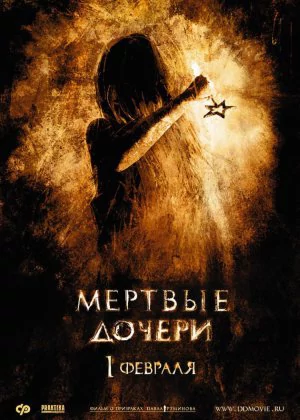Dead Daughters

Russian cinema ... it's never been my cup of tea. This goes for most Eastern European cinema really. Bored and disgruntled farmers in bleak, depressing landscapes, being pretty unhappy about life and showering themselves in pity and poverty. It is not what I prefer to see when watching a film. But things change, and clichés are there to be shattered. Enter Pavel Ruminov's Dead Daughters [Myortvye Docheri].
![screen cap from Dead Daughters [Myortvye Docheri]](/thumbs/img/articles/1200xauto/dead-daughters-1.webp)
To be fair, Ruminov is not the first Russian director to break out of the mold. The latest rebirth of genre cinema in Russia was most likely initiated by Bekmambetov's Nochnoy Dozor (Night Watch). If was the first effects-laden Russian genre film that received fair media coverage, since then others have followed in its footsteps.
Anyway, that's where the comparison with films like Nochnoy Dozor ends. Ruminov's Dead Daughters might be a genre film, but he's aiming a lot higher, and he boosts some serious artistic pretensions (which is probably the reason why his film got burned down by many in Russia).
Dead Daughters is marketed as a horror flick, which is only half of the truth. The basics are there of course, but the layout of the film is different. It takes us 10 to 15 minutes to grasp most there is to know about a legend of murdering sister ghosts, from there on Rumoniv progresses slowly and takes his time to delve into the lives of his characters.
![screen cap from Dead Daughters [Myortvye Docheri]](/thumbs/img/articles/1200xauto/dead-daughters-2.webp)
Ruminov surely delivers on an aesthetic level. Every scene is filtered to bring out the bleakness and decay of a big Russian city. Dark blue tones dominate the film, often in sharp contrast with white elements. Visually very pleasing, but not all that special. The camera work is something else. There's lots of shaky action and shots, but it feels a lot closer to the work of Boe than it does to a film like [Rec]. There is not a second where you get the impression that Ruminov isn't in control over what is shown and what isn't.
There's also a fair share of Sogo Ishii to be recognized, especially when the camera is racing behind the characters. It creates a lovely mood and it's rare to see camera work like this that well done. Ruminov also remains in control over the audio at all times, never reverting to loud scares but carefully building up an atmosphere. Add to that some snappy and precise editing, and even people with dulled-down senses will be pleased with Dead Daughters.
![screen cap from Dead Daughters [Myortvye Docheri]](/thumbs/img/articles/1200xauto/dead-daughters-3.webp)
The film might be a bit long for some, but my attention never faded. The middle part of the film keeps up the atmosphere but has very few scares or horrific sequences. It mainly brings us a look into the bleak future of several young Russians. The ending delivers though, in a marvelous scene that makes sure to remind us why this was classified as a horror film in the first place. Not all that gory or scary, but impressive nonetheless.
Don't expect a typical horror film going into Dead Daughters, but expect to be impressed by Ruminov's skill to conjure up a tense and moody atmosphere out of thin air. It's nice to see films like these coming out of Russia. At least it shows they're capable of keeping up with modern standards. Let's hope they make a similar move to genre cinema as other countries have been doing these last years.